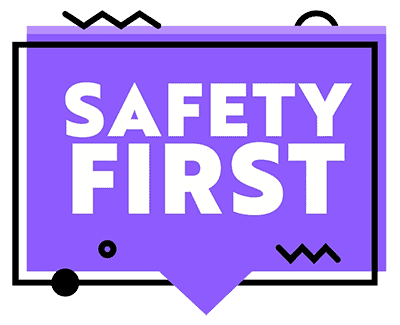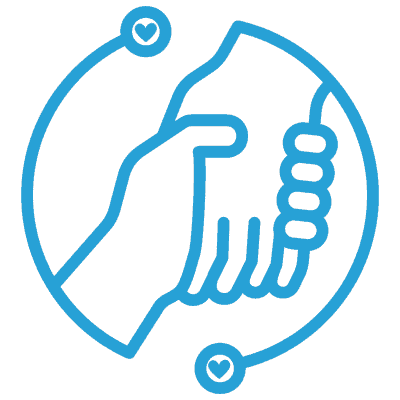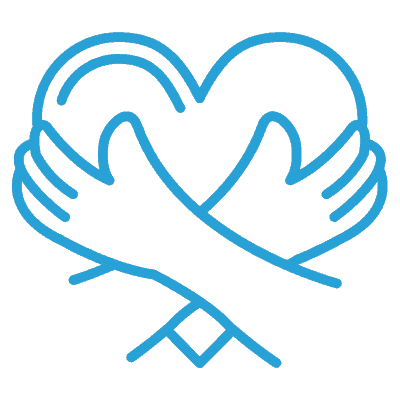Dating apps are one of the best ways to meet new people, but using them comes with some not-so-great aspects. Did you know that almost half of all online daters have been victims of some kind of harassment? Unfortunately, it comes with the territory, and although it’s a risk, it’s a reality that you need to be ready for in case it happens to you. That’s why it’s so important to be able to handle any unwanted advances and harassment in a way that keeps you (and others) safe!
Knowing what to do in these situations can empower you to protect yourself so you can keep surfing the dating apps without the fear of getting an unsolicited you-know-what-pic or a person who just won’t take “no” for an answer.
You probably already know how to recognize unwanted advances and harassment, but do you know how to respond to it? How about you can report it? We’ll tell you everything you need to know, and if you follow our advice, you can have a safer and more fun online dating environment for yourself and your fellow daters!
Recognizing Unwanted Advances and Harassment
Yes, online dating has brought with it new ways to connect with potential romantic partners, but it has also led to an increase in unwanted advances and harassment. A Pew Research Center study found that 57% of young women using dating apps have received unsolicited sexually explicit messages or images—gross. But men aren’t immune either—35% of male users have said they’ve felt harassed as well!
Definition and Examples
Unwanted advances and harassment on dating apps can take on a multitude of forms—some can be on the subtle side, while others are anything but. These can look like constant messaging despite a clear lack of interest, inappropriate comments or requests, and sending explicit images without the want or consent of the other party. Although these behaviors violate the community guidelines of almost every legit dating platform and can impact the victim’s emotional well-being, they still happen.
- Persistent Messaging – When someone keeps DMing you despite you not responding or showing any interest, it is a form of harassment. This continuous behavior makes users feel uncomfortable and unsafe.
- Inappropriate Comments or Requests – Comments that are sexual in nature, derogatory, or overly personal fall under the inappropriate advances category. Requests for explicit photos or pushing for sexual conversations are also clear indicators of harassment.
- Sending Explicit Images Without Consent – One of the most common forms of harassment on dating apps is opening up a message and being greeted with an unsolicited explicit image. Studies show that women are particularly targeted, with a big percentage reporting being victims of unwanted pics.
Red Flags
There are certain behaviors and actions that cross the line, from annoying or unwelcome to straight-up harassment. Knowing what these red flags are can help you be proactive in protecting yourself!
- Overly Aggressive or Sexual Messages – If someone’s messages quickly become aggressive or sexual, it’s a red flag—this type of behavior clearly shows that the person does not respect boundaries and is likely to escalate their actions if not addressed and nipped in the bud.
- Pressure to Meet in Person Quickly – Another glaring red flag is when someone pressures you to meet in person too quickly. Not only can it be dangerous (these are strangers), but it could also mean that the person behind the profile is only interested in physical interaction rather than in a genuine connection.
- Ignoring Your Boundaries or Responses – When someone steps over or simply ignores your boundaries, such as not taking “no” for an answer or continuing to chase you despite your lack of interest, it’s a sign of disrespect and can quickly spiral into harassment. Remember, you have the absolute right to a respectful and safe dating experience!
Immediate Response Strategies
Facing unwanted advances or harassment on dating apps is upsetting for sure, but knowing how to respond when it happens and in a decisive manner can help you hold onto your peace of mind.
Stay Calm and Assess the Situation
If and when you first encounter harassment, it’s important to keep your wits about you and take a moment to assess the situation. Try not to panic, as it can cloud your judgment and make you act impulsively, so take a deep, cleansing breath, count to ten, and gauge the nature of the messages or actions you see. This way, you can calmly figure out if the behavior is harassing or just kinda annoying (there is no wrong answer here—if you feel harassed, then you aren’t overreacting).
Set Boundaries
Let them know you are not okay with what was sent—clearly communicate your discomfort or disinterest to the person. Setting boundaries lets them know that their behavior is not acceptable. Use direct and assertive language to convey your feelings. Here are some example phrases you can use if you’re not sure what to say:
- “I’m not comfortable with the way this conversation is going.”
- “Please stop sending these types of messages.”
- “I’m not interested in pursuing this conversation further.”
- “Respect my boundaries or I will block you.”
- “Your comments are inappropriate and unwanted. Please stop.”
Setting these boundaries can put a stop to inappropriate behavior and it puts you in control of the situation.
Ignore and Block
If the person continues to harass you after you’ve set clear boundaries, now it’s time to ignore any further messages and hit that block button. All dating apps have a block feature—it’s easy to do! Below is how you can block on a few mainstream dating apps:

Tinder: Go to the profile of the person you want to block, tap the three dots in the upper right corner, and select “Report” or “Unmatch.”

eharmony: Visit the user’s profile, click on the three dots, and choose “Report” or “Block.”

Hinge: Open the conversation with the person, tap the three dots in the upper right corner, and select “Unmatch” or “Report.”

Bumble: Go to the chat screen with the person, tap the shield icon in the upper right corner, and choose “Block & Report.”
Blocking the user doesn’t just stop them from contacting you again—it also alerts the dating platform’s support team to their behavior.
Do Not Engage
Engaging with the harasser can often provoke further unwanted behavior and make the situation worse, so to avoid further escalation, do not respond to their messages. Silence can be the biggest tool in your anti-harassment arsenal—it sends a crystal clear message that you will not tolerate their behavior. It’s super important not to engage for the following reasons:
- Avoiding Escalation: Responding can give the harasser a reason to continue or ramp up their behavior.
- Maintaining Control: By not responding, you keep control over the situation and your emotional well-being.
- Preventing Further Distress: Engaging can lead to even more upsetting interactions, so it’s better to cut off communication entirely.
- Trust Your Instincts: If something feels off, it probably is. Listen to your gut and respond accordingly.
- Protect Your Privacy: Adjust your privacy settings on the app to limit who can contact you or view your dating profile, and don’t share personal info too quickly.
Taking Legal Action
If harassment escalates to the point where legal action is necessary, understanding your legal rights and options can help you protect yourself and hold the harasser accountable. If it gets to this point, you should consult with legal experts or advocacy organizations that specialize in harassment cases for help or guidance. If the harassment becomes threatening or moves offline, you should file a report with local law enforcement.
Reporting the Behavior
Being on the receiving end of unwanted advances and harassment is distressing, and that’s why reporting this kind of behavior is an important step in creating a safer environment for everyone involved. Here’s why it matters, how to do it on some of the most popular dating apps, and what exactly happens after you file a report.
Why Reporting Matters
Reporting harassment or inappropriate behavior is important for several reasons:
- Creating a Safer Environment: Reporting helps protect both you and other users. It ensures that the community remains respectful and free from harassment.
- Holding Individuals Accountable: When inappropriate behavior is reported, it holds the harasser accountable, potentially deterring future misconduct.
- Improving App Safety Measures: Consistent reporting helps app developers identify patterns of behavior and refine their safety features to better protect users.
How to Report
Here are detailed steps for reporting unwanted advances and harassment on major dating apps:

eharmony
- Step 1: Navigate to the user’s profile.
- Step 2: Click on the three dots at the top right corner.
- Step 3: Select “Report” from the dropdown menu.
- Step 4: Choose the reason for the report, such as harassment or inappropriate content.
- Step 5: Provide any additional details and submit the report.

Tinder
- Step 1: Open the conversation with the user.
- Step 2: Tap the shield icon in the upper right corner.
- Step 3: Select “Report”.
- Step 4: Choose the issue type (e.g., inappropriate messages, harassment).
- Step 5: Add necessary comments and submit.

Bumble
- Step 1: Go to the chat with the user.
- Step 2: Tap the three dots in the upper right corner.
- Step 3: Select “Block & Report”.
- Step 4: Choose the reason for reporting.
- Step 5: Provide additional details if needed and submit.

OkCupid
- Step 1: Visit the user’s profile.
- Step 2: Click on the three dots in the upper right corner.
- Step 3: Select “Report”.
- Step 4: Indicate the reason for reporting (e.g., harassment, inappropriate behavior).
- Step 5: Submit the report with any extra details.

Hinge
- Step 1: Open the conversation with the user.
- Step 2: Tap the three dots in the upper right corner.
- Step 3: Select “Unmatch” or “Report”.
- Step 4: If reporting, choose the reason.
- Step 5: Provide relevant information and submit the report.
What Happens After Reporting
After you file a report, dating apps typically follow these steps:
- Review Process: The app’s support team reviews the report to understand the nature of the complaint. This often involves examining the conversation and any submitted evidence.
- Investigation: Depending on the severity of the report, the support team might investigate further, which can include contacting both parties involved for more information.
- Action Taken: If the report is validated, the app will take appropriate action. This can range from issuing a warning to the harasser, temporarily suspending their account, or permanently banning them from the platform.
- Notification: Some apps notify the person who reported the behavior about the outcome of their report, though specifics about the actions taken may not always be disclosed due to privacy policies.
Additional Tips for Reporting
- Document the Behavior: Before reporting, take screenshots of the harassing messages or actions. This provides concrete evidence to support your report.
- Be Specific: When describing the behavior, be as specific as possible. Detailed reports are more likely to be taken seriously and acted upon quickly.
- Follow-up: If you don’t receive a response or see action taken within a reasonable time frame, follow up with the app’s support team to check the status of your report.
Understanding the Impact of Reporting
- Personal Safety: Reporting can give you peace of mind and a sense of control over the situation.
- Community Support: Your actions can inspire others to report similar behavior, contributing to a broader culture of accountability.
- Long-Term Improvements: Continuous reporting helps dating apps refine their safety measures and create better user experiences.
By taking steps to report unwanted advances and harassment, you play a part in the upkeep of a safer and more respectful online dating environment.
Verifying Your Safety
To protect yourself and have a safe experience, it’s important to take certain precautions, as with everything else in life! Read on for a comprehensive guide to help you maintain your safety while looking for love (or anything else) on dating apps.
Check and Review Privacy Settings
One of the first steps to verify your safety is to adjust your privacy settings on dating apps—this limits who can see your profile and contact you. Here are a few helpful tips:
- Control Your Visibility: Most dating apps allow you to make your profile visible only to those you match with. Utilize this feature to avoid unsolicited messages.
- Limit Location Sharing: Adjust your settings to control how much of your location is shared. Some apps allow you to set a general area rather than your exact location.
- Profile Details: Be cautious about the amount of personal information you include. Avoid sharing your last name, contact details, or any identifying information in your profile.

Share Less Personal Info
Less is always more, so keeping your personal details private is a necessity in online dating. Want to know what to steer clear of sharing? Read on:
- Avoid Financial Information: Never, ever share your social security number, bank account details, or any financial information. Romance scammers use this information for identity theft or fraud.
- Limit Personal Details: Don’t disclose your home address, workplace, or daily routines. This can prevent stalkers from finding you offline.
- Photos: Use different photos than those on your social media accounts in order to stop people from performing reverse image searches that can reveal more about you than you intend.
Use App Features
Most legit dating apps provide numerous features that are designed to improve your safety:
- Verified Profiles: Some apps allow users to verify their profiles by connecting to social media accounts or providing identification. This adds a layer of credibility to the profiles you interact with.
- Incognito Mode: Features like incognito mode allow you to browse profiles without being seen, giving you more control over who knows you are active on the app.
- Blocking and Reporting: Familiarize yourself with the app’s blocking and reporting functions. This allows you to take action if someone behaves inappropriately quickly.
Tell Friends or Family
Keeping someone you trust in the loop about your online dating activities is always a good idea!
- Share Details: Let a trusted friend or family member know about your online dating plans. Share the profile of the person you are meeting and your meeting location.
- Check-ins: Arrange to check in with a friend during the date. A quick text or call can ensure someone knows you are safe and provide a safety net if you feel uncomfortable.
- Emergency Plans: Have an exit plan in place if things don’t go well. This could include a code word to text a friend or a pre-arranged call to excuse yourself from the date.
Additional Safety Tips
- Use Video Chats: Before meeting in person, have a video call with your potential date—this confirms that the person is who they say they are and can also give you a better sense of their character.
- Public Meetings: Always meet for the first few dates in a public place. Avoid secluded areas; never invite someone to your home until you feel entirely comfortable with them.
- Control Your Transport: Drive yourself or use public transport to get to and from the date. This means you can leave whenever you want without relying on your date for a ride.
By following these guidelines, you can greatly reduce any risks that are associated with online dating and focus on building genuine connections safely. Your safety should always come first, and it’s okay to prioritize your well-being over any social interaction.
Long-Term Strategies
Online dating is undoubtedly a rewarding way to meet new people, but it also takes a committed approach to your safety and not just for immediate responses to harassment! Daters should implement long-term strategies to protect their well-being—and that entails building a strong support system, practicing self-care, and staying informed about the latest safety features and best practices!
Build a Support System
Having a support system is pretty important when you’re traversing the world of online dating—this network can provide emotional support, practical advice, and a solid sense of security.

- Connect with Friends and Family: Share your online dating experiences with close friends or family members. They can offer valuable perspectives and support, especially if you come up against any issues. And keeping them in-the-know about your dating activities doesn’t hurt in terms of safety.
- Join Online Communities: There are so many online forums and groups dedicated to dating advice and support. Websites like Reddit and specialized forums are communities full of people who share their experiences and provide tips for safe dating. They’re a great resource for advice and reassurance in all things dating.
- Professional Support: If you’ve experienced harassment or feel anxious about online dating, you might want to get help from a therapist. Professional support can assist you with navigating your emotions and developing strategies for safer dating practices.
Practice Self-Care
Experiencing harassment or negative interactions online can take a toll on your mental and emotional health, so prioritizing self-care is super important to maintaining your well-being.

- Acknowledge Your Feelings: It’s important to recognize and validate your emotions. Experiencing harassment can be distressing, and it’s okay to feel upset or anxious. Allow yourself to process these feelings rather than pushing them aside.
- Engage in Relaxation Techniques: Activities such as meditation, yoga, and deep-breathing exercises can help reduce stress and improve your mental health. Apps like Headspace and Calm offer guided sessions that can be very beneficial.
- Stay Active: Physical activity is a great way to manage stress and boost your mood. Whether it’s a daily walk, a workout session, or a sport you enjoy, staying active can significantly impact your emotional well-being.
- Limit Online Time: If you find that online dating is becoming overwhelming, it’s okay to take breaks. Spending less time on dating apps and more time engaging in offline activities can help you recharge and gain a better perspective.
Stay Informed
Keeping up with the latest safety features and best practices is essential for long-term online dating success. Technology and online behaviors are constantly evolving, and staying informed helps you stay safe.

- Follow Trusted Sources: Websites and organizations like RAINN, the National Cyber Security Alliance, and reputable dating blogs frequently update their advice and safety tips. Subscribing to their newsletters or following them on social media can keep you informed about new threats and safety strategies.
- Update Your Knowledge of App Features: Many dating apps continuously improve their safety features. Make sure you know how to use these features effectively. This includes understanding how to block and report users, how to use privacy settings, and how to verify profiles.
- Stay Aware of Scams: Scams evolve, and new tactics are always emerging. Educate yourself on the latest types of online scams, such as catfishing, phishing, and financial fraud. Websites like the Federal Trade Commission (FTC) and consumer protection blogs provide updates and tips on avoiding these scams.
- Regularly Review Your Privacy Settings: Privacy settings on social media and dating apps can change. Regularly reviewing and updating these settings can help protect your personal information from being accessed by the wrong people.
By building a support system, practicing self-care, and staying informed, you can navigate online dating more safely and confidently. These long-term strategies not only protect you but also enhance your overall online dating experience, making it more enjoyable and secure.
Resources and Support
Dealing with harassment on dating apps can be overwhelming, but there are many resources and organizations dedicated to providing support and guidance. Below is a list of reputable organizations, helplines, and further reading materials to help you navigate and cope with these situations.
Support Organizations
- Cyber Civil Rights Initiative (CCRI): CCRI is a nonprofit organization dedicated to combating online abuse and harassment. They offer resources and support for victims of online harassment, including legal assistance and educational materials.
- PEN America: Online Harassment Field Manual: This comprehensive guide by PEN America provides strategies for dealing with online harassment, including practical advice, resources, and case studies. It’s a valuable tool for anyone facing harassment on the internet.
- National Network to End Domestic Violence (NNEDV): NNEDV provides a ton of resources for those experiencing domestic violence, including online harassment. They offer safety planning, technology safety tips, and links to local resources.
- HeartMob: A platform by Hollaback!, HeartMob offers a supportive community where victims of online harassment can share their experiences and receive practical help and emotional support.
- OnlineSOS: Provides practical advice and resources for those facing online harassment, including reporting and legal steps.
Helplines and Hotlines
National Domestic Violence Hotline
Phone: 1-800-799-7233
Website: The Hotline
Offers support for victims of domestic violence, including those experiencing online harassment. Available 24/7.
Cyber Civil Rights Initiative Crisis Helpline
Phone: 1-844-878-2274
A hotline specifically for victims of nonconsensual pornography (revenge porn) and other forms of online abuse.
RAINN (Rape, Abuse & Incest National Network)
Phone: 1-800-656-HOPE (4673)
Website: RAINN
Provides support for survivors of sexual assault, including those experiencing online harassment. Offers confidential crisis support and resources.
Further Reading
- “Cyberbullying in the Digital Age” by Robin M. Kowalski, Susan P. Limber, and Patricia W. Agatston: This book offers a detailed look at the nature, causes, and effects of cyberbullying and online harassment, along with strategies for prevention and response.
- “Hate Crimes in Cyberspace” by Danielle Keats Citron: Citron’s book explores the legal landscape of online harassment and provides insights into the challenges of combating hate crimes on the internet.
- “The Gift of Fear” by Gavin de Becker: While not solely focused on online harassment, this book teaches you how to trust your instincts and stay safe in various situations, including those involving potential harassment.
Articles and Guides
- PEN America’s Online Harassment Field Manual: Online Harassment Field Manual
- RAINN: Tips for Safer Online Dating and Dating App Use
- USA Today: Don’t get Tinder swindled: Here are four essential online dating safety tips
By leveraging these resources, you can find the support and information needed to handle unwanted advances and harassment on dating apps. Whether you need immediate assistance or long-term strategies, these organizations, helplines, and reading materials can provide valuable guidance and help you stay safe.
Conclusion
Look, online dating comes with ups and downs, and one of those downs is definitely unwanted advances and harassment. But there are ways to deal with it without losing your will to date or giving up on finding love—you just have to go at it the right way. We aren’t saying it’s easy, and sometimes it can be more serious than just hitting the block button, but the majority of cases can be overcome with the right know-how and tools.
Before we go, let’s take a quick run-through of the main points we covered above:
- Recognizing Unwanted Advances and Harassment: We defined what harassment looks like on dating apps and flagged the usual signs.
- Immediate Response Strategies: Tips for keeping your cool, setting boundaries, and using app tools to block and report offenders.
- Reporting the Behavior: Step-by-step guides on reporting harassment on popular dating platforms and what happens after you file a report.
- Verifying Your Safety: Emphasized the importance of adjusting privacy settings, sharing less personal information, using safety features, and keeping friends or family in the loop.
- Long-Term Strategies: The importance of building a support network, practicing self-care, and staying updated on safety features and practices.
- Resources and Support: Provided information on support organizations, helplines, and further reading to help you navigate and overcome online harassment.
You deserve to feel safe and respected while using dating apps—no one should have to put up with harassment. By being informed and taking proactive steps, you can protect yourself and also contribute to a safer online dating community. Yes, love is important, but so is your well-being; that comes first!
We always love to hear from our readers, so please tell us your experiences (both good and bad) and any tips you have for other daters on this subject in the comments below! Your stories and advice can be incredibly helpful to others going through similar situations. And don’t forget, reporting harassment not only helps you but also helps make the online dating world a better place for everyone. Sometimes, it’s okay to be a narc—in fact, we encourage it in these instances.
